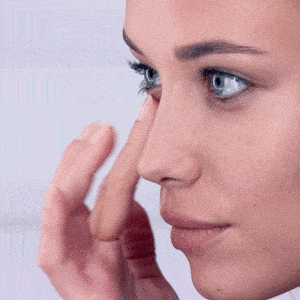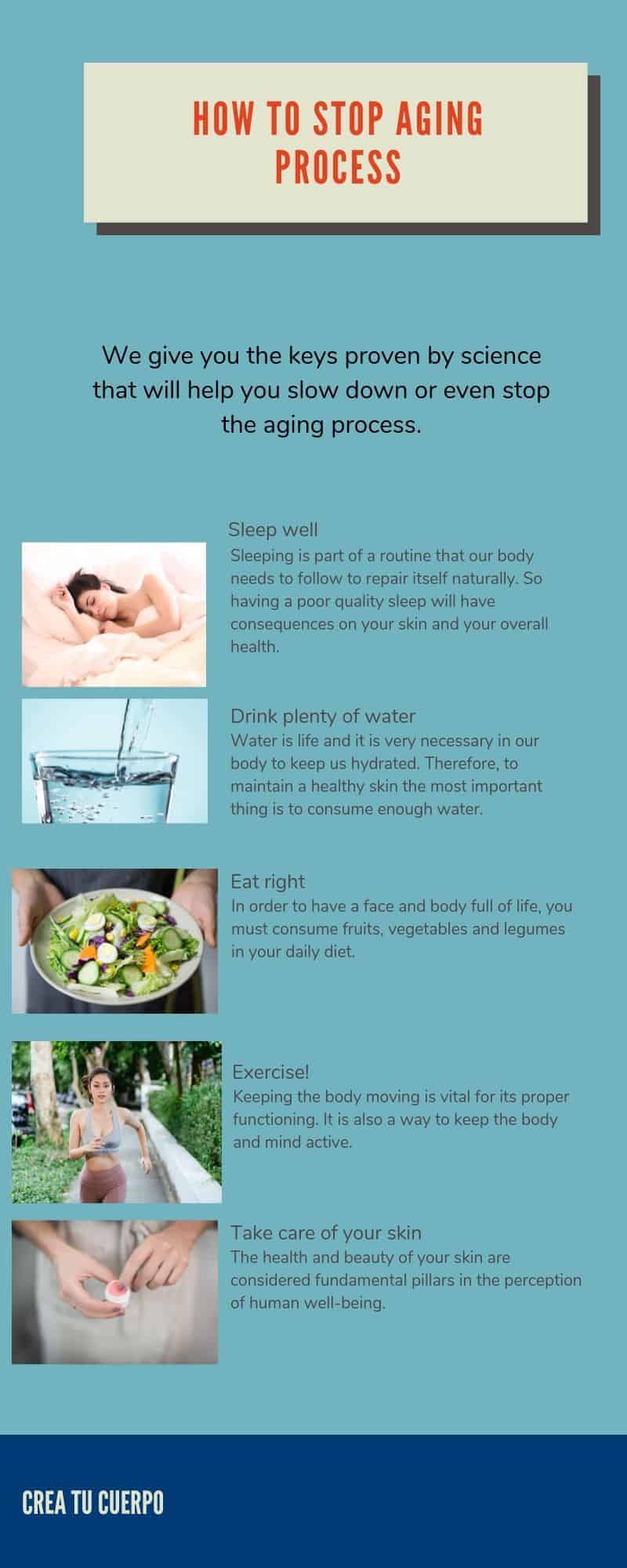Secrets of How to Slow Down Aging, What You Don't Know

How to prevent or slow down aging?
Delaying Aging? Aging is a natural part of life. It is a process that begins from the very day of our birth, being in fact unavoidable.
Nevertheless, the human being in his eagerness to find immortality has looked for the way to delay or, if possible, to stop the effects that the passage of time has on the organism.

Success in this goal has been rather disappointing. We have not yet found the source of eternal youth, but this does not mean that no progress has been made, on the contrary, science continues to try and there have been interesting developments lately.
Getting old!! It's the word that has terrified all of us women since time immemorial and that sometimes we really refuse to accept… But what is aging?
Aging is an organic process consisting of a set of physical, metabolic, mental, morphological, physiological, and functional transformations that occur as a consequence of the action of time in a living being.
In humans, for example, as we get older, the signs of aging are progressively reflected in our skin, in our motor capacity, in our joints, in the daily energy we have to do our activities, among other things.
That's why we women are so concerned about age and its obvious consequences, that's how it is!

And while we're watching the ravages of the years in our lives, we wonder how to avoid it.
But although even if you girls do not believe it, in addition to pharmacological products and medications intended for this purpose, nature also allows us to use it as an ideal and healthier tool for our requirements against aging, that is why today I will give you a few tips to start now to change habits and care about you as it is the only way to delay its effects.
The importance of sleep to slow down aging. Sleep well!
Sleeping is part of a routine that our body needs to follow to repair itself naturally. So having a bad quality sleep will have consequences on your skin and your general health.
Who doesn't like to sleep? If it's one of the pleasures of life that sometimes we can't control (if you're as sleepy as I am). Sometimes we take away the importance it deserves and due to our daily occupations, we reduce the adequate time for our body to rest what it needs.
It is recommended to sleep 7 to 8 hours a day. Obviously sometimes our duties force us to reduce this amount of hours. However, in the end, the important thing is that you have a sleep that allows you to rest and that you wake up with enough energy to start your new day.
If you have problems with your quality of sleep, I recommend incursions into meditation techniques or yoga. In addition to helping you free your body, mind, and soul from those things that disturb you, it will have powerful advantages that will help you sleep better.
Sleep well, live longer

Older adults don't sleep as much or as well as younger adults. It has always been believed, more anecdotally than scientifically, that this is because as the years go by, fewer hours of sleep are required to rest because physical activity also decreases.
But is this true? The most recent studies prove that aging is associated with a diminished ability to fall asleep and maintain sleep. In fact, sleep disruption is considered "normal" in older people, although the truth is that this phenomenon is harmful and has important causes and consequences.
The two basic components of sleep:
- Structure of sleep, also known as macro sleep, which includes the duration and stages of sleep.
- Sleep architecture, known as microsleep that includes the quantity and quality of sleep oscillations.
They change as we approach old age. Unfortunately, these modifications, which should not be considered normal, are related to neurodegenerative diseases such as dementia and Alzheimer's disease.
But this finding, which may seem desolate, is also an alternative because if we know that sleep disturbances cause these pathologies if we treat them accordingly they can be avoided.
Californian Dream
Drs. Bryce Mander, Joseph Winer, and Matthew Walker, all from the University of California at Berkeley. They conducted a large study analyzing the factors that cause changes in sleep patterns in adults. There are also consequences in the evolution of aging and memory.
Their conclusions, without being definitive or binding. They are more inclined towards the hypothesis that adults do not have a reduced need for sleep. Rather, they have problems falling and staying asleep.
This assumption provides an even more important element which is the natural and direct relationship between sleep, aging, and memory.
In fact, when a treatment (pharmacological or not) has been established to help adults sleep. A significant reduction has been observed in the risk and/or severity of the cognitive decline that usually accompanies old age.
As is often the case in these cases, scientists come up with the need for new research. But they suggest treating sleep disorders to avoid:
- Premature aging.
- Memory deficit.
- And the appearance of such catastrophic diseases as dementia and Alzheimer's.
Avoid tobacco and other harmful substances
Obviously, the consumption of harmful substances (such as cigarettes and narcotic substances) considerably affects our organism. The cells start to deteriorate, making you look up to 10 years older. Of course, besides being worried about how you look, your organs will also be more "aged".
Although the process of quitting smoking is not easy. Make an effort to reduce or avoid it and improve your overall health and appearance.
You can start by substituting the anxiety that comes from consuming any substance for a healthy drink or nut. The idea is to deceive your mind and divert attention from that need. We know it's a complicated matter, but with determination and will it's possible, take care!
Consume enough water and hydrate yourself
Water is life and it is very necessary for our body to keep us hydrated. Therefore, to maintain healthy skin the most important thing is to consume enough water.
It is usually said that approximately 2 liters per day, depending on your weight and body composition. If you are overweight, your body's requirements for water consumption will be higher.
Another important point to have a soft and healthy skin is that you must moisturize it twice a day, otherwise, it can dry out and present a slight peeling. Apply daily, when you wake up and before bed, creams for your type of skin, this will maintain the flexibility of your face and avoid flaccidity.
Finally, a good hydration is a guarantee of a radiant face, free of spots, and prevents wrinkles.
Foods to Slow Down Aging
To have a face and body full of life, you must consume fruits, vegetables, and legumes in your daily diet. These are foods that have natural antioxidants. That's why I'll mention some of the most important ones for you to keep in mind:
- Broccoli.
- Avocados.
- Berries (blackberries, strawberries, raspberries, blueberries…).
- Sprouts and all cabbages in general.
- Carrots.
- Grapes (contain up to 20 antioxidants).
- Citrus fruits.
- Onions (especially purple).
- Spinach and tomatoes.
Foods rich in Vitamin C can significantly increase collagen production. This helps to regenerate the skin and to avoid wrinkles, unlike chocolates and fats, which produce acne.
So eating a healthy diet, high in vitamins, will be favorable for maintaining a healthy and luminous face. Also to eliminate those extra pounds.
Remember that a balanced diet involves consuming in the day 5 servings between fruits and vegetables, so eat healthily!
Importance of diet in anti-aging therapy
Much has been said in recent years about the ketogenic diet. A style of nutrition that promotes some caloric restriction has shown interesting results in terms of longevity and health in later stages of life.
The benefits in dietary changes appear to be mediated by a number of molecular elements, including a ketone known as beta-hydroxybutyrate or BHB.
This compound is a normal product of the organism synthesized in the liver from fatty tissue. It is present as a source of energy in states of prolonged fasting or dietary restriction. Its appearance has been associated with increased longevity, cognitive protection, cancer reduction, and immune rejuvenation.
There are several proven mechanisms through which BHB acts as an anti-aging agent. Some are more complex than others, but all are aimed at regulating the body's inflammatory processes. Also the genetic expression of certain proteins that are involved in the appearance of several diseases in elderly people.
The ketogenic diet is one that results in the release of high levels of BHB. Without the strict need for prolonged fasting or intense physical exercise. This is achieved by almost completely removing carbohydrates from the diet, thus stimulating endogenous ketogenesis.
Science Behind Diet for Longevity
A Californian scientific group conducted research on the ketogenic diet in experimental animals. To evaluate its effects on life expectancy and memory quality.
The results of this trial were published in 2015 by the journal Cell Metabolism.
They show that exposure to a ketogenic diet over long periods of time reduces mortality and preserves memory in rodents.
These effects are very similar to those obtained with dietary restrictions. Also with the consumption of metformin and rapamycin and are known as mimetized caloric restriction.

Furthermore, another international scientific group, made up of specialists from the United States, Italy, Germany, and England, was able to identify several metabolic, molecular and cellular mechanisms that intervene in the body's response to dietary modifications.
They determined that not the only caloric restriction is important.
- Mealtime.
- Also, nutritional modulation.
- And finally, the limitation of other ingredients.
Not only calories play a fundamental role in the promotion of a better state of health and greater longevity if you want to have more information about correct nutrition you can find it here.
How to slow down aging?. Exercise frequently.
Keeping the body moving is vital for its proper functioning. It is also a way to keep the body and mind active, helping considerably to:
- Keep muscles and skin tone.
- Prevents memory loss, osteoporosis, cardiovascular disease, various types of cancer.
- It helps detoxify the body.
A study argues that constant exercise over the course of a lifetime is undoubtedly the best medicine to slow down the aging process and stay healthy.
Aging alone does not cause immune protection to be lost. What causes this loss is a lack of exercise.
In fact, in 400 B.C., Hippocrates said exercise is man's best medicine. His message has been lost over time and we are an increasingly sedentary society.
Even if you've been a little activity since your youth, you can benefit from starting a regular exercise routine as you mature in life.
To get the most benefit, regular exercise sessions should begin before age 65. It should also be done four or five times a week. The most important thing is to dedicate some time every week so as not to fall into sedentarism and help our organism to function properly.
Value of physical exercise

As life expectancy increases (a very common phenomenon in recent decades), so does the number of older adults suffering from an age-related illness. Therefore, reducing morbidity and mortality in this age group has become the subject of multiple studies today.
Even though a significant number of drugs have been presented as rejuvenating therapies. None has shown too much effectiveness in preventing the progression of cardiovascular pathologies.
Thus, lifestyle changes, including physical exercise, have received much attention from researchers.
Much has already been saying about autophagy. This process of removing and recycling damaged cell tissue and replacing it with a new one is critical in preventing aging.
It is known with certainty that caloric restriction produces a beneficial response by stimulating autophagy, delaying the appearance of cardiac abnormalities. Likewise, physical exercise improves general health and reduces cardiovascular risks by inducing this same mechanism of tissue renewal.
Do all exercises work for longevity?
An in-depth bibliographic review by Dr. Haili Tian, Dr. Peijie Chen, and Dr. Jun Ren. At the Center for Cardiovascular Research and Alternative Medicine at the University of Wyoming. It was published this year in the journal Aging (with support from the China Postdoctoral Science Foundation).
It shows that physical activity is a protective factor against the passage of time. Also, some specific exercises can trigger adverse events. Such as myocardial infarction or cerebrovascular disease. Especially in older adults with limited mobility.
These researchers compared different exercise programs divided into three main groups:
- Intense training (running continuously).
- Intermediate training (series of 4 exercises x 4 repetitions).
- Resistance training (circuit with 8 different stations and devices).
The results showed that the first two schemes were beneficial for older people but the third carried risks of acute heart disease. However, any physical activity increased the body's regenerative capacity. It also improved glucose metabolism and decreased body fat composition, thus contributing to healthy aging.
Their conclusion is that the entire older population would benefit from regular physical activity, with the exception of high-intensity exercise.
It's important to mention that you don't have to go to a gym to keep up with your daily routine. From home, you can spend some time trying to find simple exercises. You can also walk about 30 minutes where you live. There are always options you can try if you don't have the time or availability to go to a gym.
That's why you have no excuse, so let's move!!
How to slow down the aging of your face and skin in general?
Most of the scientific material selected for this text talks about methods to prevent or slow down aging from a molecular point of view. These changes are not automatically reflected in the mirror.
The health and beauty of the skin are considered fundamental pillars in the perception of human well-being. For this reason, many anti-aging strategies have been developed for skincare. Skin aging is a complex biological process influenced by numerous intrinsic and extrinsic factors. These, over time, lead to progressive changes in each layer of the skin, especially in sun-exposed areas.
It can be deduced that one of the most important causes of skin aging is the low cell turnover that occurs in older adults. The same principle of autophagy applies here. This is also reflected in the loss of elasticity, discoloration and thinning of the skin.
There are three structural components of the dermis on which most of the scientific effort aimed at skincare has been devoted: collagen, elastin, and glycosaminoglycans. Efforts have also been made to act on muscular flaccidity, redistribution of local fat and loss of bone support, all of which contribute to skin regeneration, especially on the face.

Abundant Alternatives
A few years ago, the journal Dermato-Endocrinology published an article summarising the most important strategies for preventing skin aging.
And options abound. From simple cosmetological management to invasive procedures, without leaving aside preventive medicine. Currently, we have multiple alternatives to take care of our skin.
Some will consider these treatments as superficial or merely aesthetic. But when they realize that skin aging can lead to serious, even malignant diseases such as skin cancer, they may change their minds.
The most interesting thing about this study by Lithuanian and German doctors is that all the procedures described have a scientific basis. They did not just mention the different techniques for skincare and rejuvenation. They also delved into their physiological actions and explained the science behind their use.
The most important procedures in this article are listed below:
- Cosmetic care:
- Daily Skin Care
- Proper sun protection
- Non-invasive cosmetic procedures
- Topical agents:
- Antioxidants (vitamins, polyphenols, and flavonoids)
- Cellular regulators (retinol, peptides and growth factors)
- Invasive procedures:
- Chemical Peeling
- Visible-light devices:
- Laser
- Intense light pulses
- Ablative and non-ablative photo-rejuvenation
- Radio-frequency
- Skin injections for biostimulation and rejuvenation
- Dermal Fillers
- Platelet-rich plasma
- Botulinum toxin
- Prevention and removal of active moles
- Restoration and redistribution of fatty volume, increase and contour of the skin
- Systemic agents:
- Hormone replacement therapy
- Anti-Oxidants
- Avoid exogenous aging factors and correct lifestyle and habits (prevention)
Ultimately, anti-aging treatments are in style and should not be regarded as a purely aesthetic matter. It is closely linked to a better quality of life and a friendlier old age.
There is still a lot of research to be done on this subject. But today we can say that the golden years will shine brighter thanks to science.
Beware of UV rays
Although this advice sounds cliché, it is the first thing we must take into consideration if we want to preserve the healthy characteristics of our skin for longer and avoid wrinkles.
Don't forget that skin uses sunlight to make vitamin D. This is very important for normal bone formation.
But sometimes, ultraviolet rays can be very damaging. This is because inside the epidermal (outer) layer of the skin there are cells that contain the pigment called melanin.
It aims to protect the skin from these rays of the sun. Without a previous and prolonged care (if it is frequently exposed to the sun) they can burn it and with time. In addition, it reduces its elasticity, causing its degradation and allowing the person to look aged prematurely.
That's why it shouldn't be missing in your daily care cosmetics, sunscreen for the face. Also, one for your body if you are exposed to the sun in some way. On the market, there are different brands for different skin types and different protection capacities that can be adapted to your requirements.
So if your skin is oily. You may think that applying sunscreen before you leave home will cause you more discomfort with respect to oily production. Don't worry, there are also oil-free face shields that absorb automatically and you won't have that problem. That way, there's no excuse for overlooking this. So go out and buy your sunscreen.
You'll be grateful!
Always take off your makeup when you go to sleep.
Not removing the makeup we put on during the day is one of the most serious mistakes we women can make.
Sometimes it happens because when we get home we are too tired or we just don't pay attention to it. In the end we only wash it with water, without knowing that we are leaving traces of makeup that get into the pores and block them.
The importance of removing toxins from the skin is essential to prevent skin aging. A good cleansing of the face is a fundamental part of facial care to activate the process of skin regeneration.
If you want to have a smooth and wrinkle-free complexion, removing make-up is essential in everyday life. So take advantage of the last impulse before going to bed and take off your make-up, let your skin breathe. It is also recommended to exfoliate at least twice a week.
Use fast anti-aging face masks
If you prefer totally natural methods, you should use natural masks.
You can make these with fruits and food from the daily consumption that you have at home and then I will introduce you:
- Moisturize, exfoliate, and illuminate your skin. Apply honey alone and let it rest for 20 minutes. Cleanse with plenty of warm water.
- Cleansing and exfoliation lotion. Mix 2 tablespoons of ground almonds with 1/2 lemon juice and 1 tablespoon of honey. Massage gently over face and rinse with warm water.
- Moisturizing and firming facial mask. Mix 1 teaspoon of glycerin, 1 egg white, 1 tablespoon of honey, and flour necessary to form a paste. Apply to face and neck and leave to rest for 10 minutes, then rinse with plenty of lukewarm water.
- Softener for dry skin. Add one teaspoon of milk and one teaspoon of honey, mix well. Apply to your face and let it rest for 10 minutes; rinse with warm water, brighten and rejuvenate your skin. Mix two tablespoons of chickpea flour (you can substitute oatmeal) with 1/4 teaspoon of turmeric. Slowly add a little honey and milk, until you get a smooth but not liquid paste. Spread over your face and neck, and let stand for 15 minutes; then rinse with warm and finally cold water.
- Eliminates wrinkles. Remove the inner membrane of the eggshell (a thin, white, transparent fabric) and then place it on your face where you have wrinkles. Let it dry (you'll feel your skin stretch) and then remove it with water.
Use natural oils to prevent aging
Natural oils are the best choice for keeping facial skin looking like new. That's why I'll recommend some oils that you can buy in health food stores. They can also be used to put them on daily while you are at home.
- Jojoba Oil: As the body ages, the sebaceous glands, which produce natural oils and hydrate the skin, decrease their production. Jojoba oil replenishes these oils and even rehydrates dry skin. It also helps eliminate fine lines and delay the aging process.
- Sweet almond oil: As we age, our skin loses elasticity. To help regain it, sweet almond oil, full of vitamins E and K, should be applied.
- Coconut Oil: Also filled with vitamin E, coconut oil can be helpful in reducing stretch marks and preventing cellulite. Hormonal changes in women can contribute to the formation of cellulite. So coconut oil strengthens the skin and prevents that formation.
- Geranium oil: Geranium oil is considered effective in reducing age spots and scars. As we age, skin tone loses uniformity. Applying geranium oil can help restore even skin tone.
- Argan Oil: Argan oil is excellent for improving skin elasticity, removing fine lines and wrinkles. In addition to moisturizing the skin because it is composed almost entirely of fatty acids.
And for this reason, the golden years look better every day!
Can you stop or reverse aging?. Scientific Advances
The classic anti-aging techniques are still in force:
- Healthy lifestyle, balanced diets.
- Constant exercise.
- Consumption of vitamin complexes with or without minerals is part of any therapy that promises to fight against age.
But the current trend focuses on chemistry and pharmacology. Doctors and researchers around the world are beginning to see drugs that prevent aging as legitimate treatments and are asking regulatory agencies to recognize it. These drugs not only serve an aesthetic purpose but would help prevent and manage many pathologies unequivocally associated with advanced age.
Delay cellular aging process. What medications delay or reverse aging?
The anti-aging effects of the drugs listed below have been discovered as fortuitous findings. All of them have been thought for a different purpose and eventually demonstrated an additional benefit: slowing the aging process.
Aspirin
One of the best-known drugs in the world has been revised frequently and always discover new benefits brought by its consumption. The active molecule of aspirin was isolated from the bark and willow leaves by several scientists in the 19th century. But its use dates back at least 1000 years BC. The ancient Egyptians, Sumerians, and the Chinese used it empirically to treat febrile and painful conditions.
Many decades later, in the 1970s, its antiplatelet agent effect was discovered. It was used as a cardioprotective, and lately, a new use has emerged for aspirin: anti-aging.
Autophagy is a complex process of controlled cell destruction, which aids in the recycling of tissues. This mechanism is fundamental for the body to stay young, thanks to the renewal of all organs and systems. Unfortunately, autophagy slows down with the passing of time and in older adults, it hardly occurs. This is where aspirin comes in. Several studies have shown that this drug is able to reactivate autophagy flow, preventing or decreasing age-related metabolic dysfunctions.
Recent Evidence
For the past 2 years, an important group of French, Greek, and Austrian scientists has been studying how aspirin works to prevent aging. Data indicate that aspirin has a similar effect to a low-calorie diet, known as mimetized calorie restriction.
Low-calorie consumption has been shown to prolong life expectancy and good health.
This happens in experimental animals as well as in human beings. That is why we are looking for a drug that imitates this result.
Mimetic calorie restriction is achieved by reducing protein acetylation by inhibiting the enzymatic activity of EP300. This complex naming and explaining mechanism can be summarized as follows:
- EP300 is an enzyme whose main task is to decrease cellular autophagy. Therefore, if its action is stopped, it is stimulating tissue renewal and rejuvenation of the organism.
- In addition, aspirin has no cytotoxic effect, so there is no stimulation of disorganized or anarchic destruction of any organ.
These results are very encouraging and new studies are currently underway to determine specifically which metabolite of aspirin is responsible for the increase in autophagy flow and whether any other substance can contribute to this.
Spermidine, a compound extracted from human semen, looks promising.
Metformin
Several clinical trials, conducted from almost half a century ago to the present day, have shown that hyperglycemia and hyperinsulinemia are important factors in aging.
Insulin and insulin-like growth factors (IGFs) are molecules related to longevity and the inactivation of the genes that control them.
A significant increase in life expectancy and cancer prevention was achieved in experimental animals. As a result, anti-diabetic drugs have become new candidates for anti-aging pharmacological treatment.
As already mentioned in the section on aspirin, caloric restriction has proved to be a consistent element in increasing life expectancy. Also in the decrease of diseases related to old age.
The crucial event through which caloric restriction acts is the reduction in insulin and IGF levels. However, it is also important to increase insulin sensitivity.
These same effects obtained with caloric restriction can be reproduced with the administration of metformin.
It achieves the additional benefit of glycaemic control and the reduction of tumor diseases and cancer.
What does science say?
For at least 40 years it has been suggested that biguanides (a family of drugs to which metformin belongs), would be useful in anti-aging treatment.
Some time ago, in 2010, Aging magazine published a meta-analysis conducted by Russian doctor Vladimir N. Anisimov. This showed that the effects of metformin consumption were more positive than those obtained by calorie reduction. It was more effective in preventing physical deterioration associated with alterations in glucose and insulin metabolism.
Also, people on biguanide treatment were found to have better parameters of fertility and resistance to oxidative stress in later life. Finally, as an encouraging finding, these patients suffered fewer oncological diseases when compared to the untreated population.
The popular scientific weekly Nature, which has 150 years of history, published an article by Erika Check Hayden in 2015. In this article, a large number of researchers claimed that metformin was a drug with a proven anti-aging effect. They also asked regulators to authorize its sale for this purpose, beyond its usual use as an anti-diabetic. Once the FDA approves this negotiation, a definitive step will have been taken in the fight against aging.
Rapamycin
Also known as sirolimus, it is a drug commonly used as an immunosuppressant. Also to prevent organ rejection in transplant patients and as an anti-cancer drug.
But since the beginning of the 21st century, studies have been published stating that this drug is capable of prolonging life in a wide variety of experimental animals and even in humans. Rapamycin acts on the genes that encode a protein known as mTOR, which performs numerous functions related to longevity.
Activation of the mTOR can lead to the formation of two distinct protein complexes:
- mTORC1, involved in the delay of aging.
- mTORC2, related to adverse events following the administration of rapamycin.
This dichotomy has perpetuated the hesitation of many health professionals. About its use as an anti-aging drug, but things are about to change.
Easter Island Wonder
Rapamycin is a macrolide produced by Streptomyces hygroscopicus bacteria. It was first discovered in soil samples from Easter Island.
It was originally described as an antifungal drug, although it soon became evident that its immunosuppressive and anticancer activity was more important. In the last decade, various clinical trials have also demonstrated its effectiveness as a regulator of metabolism and aging.
There is a journal dependent on the University of Oxford, The Journals of Gerontology Series A: Biological Sciences and Medical Sciences. In 2016, this journal published a paper by Sebastian I. Arriola-Apelo and Dudley W. Lamming, in which they describe the behavior of rapamycin in all its facets and provide very interesting data.
Several scientists argue that the anti-aging activity of rapamycin is a consequence of its powerful anti-cancer effect. Therefore, cancer is one of the main causes of death in old age. If it can be reduced or avoided, life expectancy is prolonged.
However, Arriola-Apelo and Lamming show that rapamycin can slow down the passing of time. Not only avoiding the appearance of oncological diseases but a wider group of diseases that are related to age.
Not only that, but they also point out that adverse events appear with the chronic use of rapamycin. They even propose a consumption scheme known as Intermittent Rapamycin. In which they administer the drug 3 times a week for 2 weeks with a period without medication of another 2 weeks. Thus managing to activate only the protein complex mTORC1 - the beneficial - and not mTORC2 - the harmful -.
Many issues remain to be resolved, but the future of rapamycin-based anti-aging therapy is bright.
Resveratrol
Foods rich in polyphenols protect against age-related diseases, such as atherosclerosis, high blood pressure, cancer, arthritis, osteoporosis, cataracts, and even Alzheimer's disease. Resveratrol (polyphenol present in grapes, berries, and other foods). It has been shown to regulate oxidative stress. It reduces the production of free radicals, decreasing the destruction of mitochondrial DNA. Thus avoiding cellular aging and promoting controlled cellular apoptosis and autophagy.
Resveratrol is chemically a phytoestrogen. It, therefore, acts through the activation of estrogenic receptors in the body. The mechanism by which it achieves its protective and anti-aging effects have not yet been revealed. But we are close to doing so.
Knowledge fresh from the laboratory
A group of researchers from the Medical University of the South, in Guangdong - China, led by doctors Ligen Du and Enping Chen. They published a scientific paper in early 2019 in the journal Drug Design, Development, and Therapy. In it, they study the effects of resveratrol on umbilical cord endothelial cells that had been intentionally aged through the use of hydrogen peroxide.
The ultimate goal of this trial was to test whether or not this polyphenol was able to reduce cellular aging by regulating autophagy. The cells were cultured for 24 hours.
Then senescence was induced with hydrogen peroxide and finally, they were treated with minute amounts of resveratrol, evaluating their reactions. The results were encouraging.
Resveratrol showed a great protective effect of endothelial cells, preventing the potential appearance of atherosclerosis, arterial stiffness, and vascular weakness.
By promoting the autophagy of aging cells, the number of harmful substances was dramatically reduced. This delayed the pathological progress of aging and prevented the appearance of cardiovascular diseases.
These findings suggest that sooner rather than later, resveratrol will be a new compound for the treatment of time-related pathologies. Especially in the cardiovascular sphere.
Latest Scientific Findings on Anti-Aging
Just a few days ago, the journal Aging Cell published a study by a group of U.S. researchers. In this, they showed that the consumption over 12 months of 3 drugs already available on the market. Growth hormone, metformin, and prasterone. He was able to reverse the biological aging of the organism.
This means that not only did the passage of time slow down or stop, but it was also possible to go back in time. These "futuristic" results go a step further in the fight against old age and the diseases that accompany it.
The golden years are getting closer every day.
References
- Piskovatska V, Strilbytska O, Koliada A, Vaiserman A y Lushchak O (2019). Health Benefits of Anti-aging Drugs. Biochemistry and Cell Biology of Ageing: Part II Clinical Science, volume 91.
- Pietrocola, F, Castoldi, F, Markaki, M, Kroemer G, Lachkar S, Chen G, Enot DP y collaborators (2018). Aspirin Recapitulates Features of Caloric Restriction. Cell reports, 22(9), 2395–2407.
- Castillo-Quan JI, Kinghorn KJ y Bjedov I (2015). Chapter One - Genetics and Pharmacology of Longevity: The Road to Therapeutics for Healthy Aging. Advances in Genetics, 90, 1 – 101.
- Anisimov VN (2013). Metformin: do we finally have an anti-aging drug?. Cell cycle (Georgetown, Texas), 12(22), 3483–3489.
- Anisimov VN (2010). Metformin for aging and cancer prevention. Aging, 2(11), 760–774.
- Riera CE y Dillin A (2015). Can aging be 'drugged'? Nature Medicine, 21, 1400 – 1405.
- Check-Hayden E (2015). Anti-aging pill pushed as bona fide drug. Nature, 522 (7556), 265-266.
- Tardif S, Ross C, Bergman P, Fernandez E, Javors M, Salmon A, Spross J, Strong R y Richardson A (2015). Testing efficacy of administration of the anti-aging drug rapamycin in a nonhuman primate, the common marmoset. The Journals of Gerontology Series A: Biological Sciences and Medical Sciences, 70(5):577-87.
- Arriola-Apelo SI y Lamming, DW (2016). Rapamycin: An InhibiTOR of Aging Emerges From the Soil of Easter Island. The journals of gerontology. Series A, Biological sciences and medical sciences, 71(7), 841–849.
- Li YR, Li S y Lin CC (2017). Effect of resveratrol and pterostilbene on aging and longevity. BioFactors, 44(1), 69-82.
- Du L, Chen E, Wu T, Ruan Y y Wu S (2019). Resveratrol attenuates hydrogen peroxide-induced aging through the upregulation of autophagy in human umbilical vein endothelial cells. Drug design, development, and therapy, 13, 747–755.
- Fahy GM, Brooke RT, Watson JP, Good Z, Vasanawala SS, Maecker H, Leipold MD, Lin DTS, Kobor MS y Horvath S (2019). Reversal of epigenetic aging and immunosenescent trends in humans. Aging Cell, version online.
- Doszhanova G, Abduldayeva A y Dosmambetova K (2017). Aging Biomarkers for Evaluating the LifeStyle Quality of Elderly and Senile People. Iranian Journal of Public Health, 47(5): 757-758.
- Newman JC, Covarrubias AJ, Zhao M, Yu X, Gut P, Ng CP, Huang Y, Haldar S y Verdin E (2017). The ketogenic diet reduces mid-life mortality and improves memory in aging mice. Cell Metabolism, 26(3): 547-557.
- Fontana L y Partridge L (2015). Promoting Health and Longevity through Diet: From Model Organisms to Humans. Cell, 161(1): 106-118.
- Tian H, Chen P y Ren J (2019). Physical exercise, autophagy, and cardiometabolic stress in aging. Aging, 11(15): 5287-5288.
- Mander BA, Winer JR y Walker MP (2017). Sleep and Human Aging. Neuron, 94(1): 19-36.
- Ganceviciene R, Liakou AI, Theodoridis A, Makrantonaki E y Zouboulis CC (2012). Skin anti-aging strategies. Dermato-Endocrinology, 4(3): 308-319.
Visual Overview

